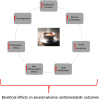Coffee consumption and cardiometabolic health: a comprehensive review of the evidence
- PMID: 38963648
- PMCID: PMC11493900
- DOI: 10.1007/s11357-024-01262-5
Coffee consumption and cardiometabolic health: a comprehensive review of the evidence
Abstract
This review provides a comprehensive synthesis of longitudinal observational and interventional studies on the cardiometabolic effects of coffee consumption. It explores biological mechanisms, and clinical and policy implications, and highlights gaps in the evidence while suggesting future research directions. It also reviews evidence on the causal relationships between coffee consumption and cardiometabolic outcomes from Mendelian randomization (MR) studies. Findings indicate that while coffee may cause short-term increases in blood pressure, it does not contribute to long-term hypertension risk. There is limited evidence indicating that coffee intake might reduce the risk of metabolic syndrome and non-alcoholic fatty liver disease. Furthermore, coffee consumption is consistently linked with reduced risks of type 2 diabetes (T2D) and chronic kidney disease (CKD), showing dose-response relationships. The relationship between coffee and cardiovascular disease is complex, showing potential stroke prevention benefits but ambiguous effects on coronary heart disease. Moderate coffee consumption, typically ranging from 1 to 5 cups per day, is linked to a reduced risk of heart failure, while its impact on atrial fibrillation remains inconclusive. Furthermore, coffee consumption is associated with a lower risk of all-cause mortality, following a U-shaped pattern, with the largest risk reduction observed at moderate consumption levels. Except for T2D and CKD, MR studies do not robustly support a causal link between coffee consumption and adverse cardiometabolic outcomes. The potential beneficial effects of coffee on cardiometabolic health are consistent across age, sex, geographical regions, and coffee subtypes and are multi-dimensional, involving antioxidative, anti-inflammatory, lipid-modulating, insulin-sensitizing, and thermogenic effects. Based on its beneficial effects on cardiometabolic health and fundamental biological processes involved in aging, moderate coffee consumption has the potential to contribute to extending the healthspan and increasing longevity. The findings underscore the need for future research to understand the underlying mechanisms and refine health recommendations regarding coffee consumption.
Keywords: Caffeine; Cardiometabolic; Cardiovascular disease; Chronic kidney disease; Coffee consumption; Hypertension; Mortality; Type 2 diabetes.
© 2024. The Author(s).
Conflict of interest statement
The authors declare no competing interests.
Figures


References
-
- World Health Organization. Hypertension: Key Facts (2023). https://www.who.int/news-room/fact-sheets/detail/hypertension. Accessed 22 Dec 2023.
-
- Grundy SM, Cleeman JI, Daniels SR, Donato KA, Eckel RH, Franklin BA, et al. Diagnosis and management of the metabolic syndrome: an American Heart Association/National Heart, Lung, and Blood Institute Scientific Statement. Circulation. 2005;112(17):2735–52. - PubMed
-
- Sattar N, Gaw A, Scherbakova O, Ford I, O'Reilly DS, Haffner SM, et al. Metabolic syndrome with and without C-reactive protein as a predictor of coronary heart disease and diabetes in the West of Scotland Coronary Prevention Study. Circulation. 2003;108(4):414–9. - PubMed
Publication types
MeSH terms
Substances
LinkOut - more resources
Full Text Sources

